#ReactNativeDevelopers
Explore tagged Tumblr posts
Text

Unlock the Potential of React Native
Ready to upgrade your Xamarin app? React Native is a powerful framework that delivers superior performance and a more engaging user experience. By transitioning to React Native, you can take advantage of the latest mobile development technologies and ensure your app stays competitive in the market. Our skilled developers specialize in making this transition smooth and hassle-free.
Reach out to us now and let's discuss how we can transform your app!
#ConnectInfosoft#ReactNative#XamarinUpgrade#MobileDevelopment#AppTransition#SuperiorPerformance#UserExperience#TechInnovation#MobileTech#AppDevelopment#ReactNativeDevelopers#TechUpgrade#ModernApps#MobileFramework#SeamlessTransition#CompetitiveEdge#FutureOfApps#TechTrends#AppEvolution#MobileSolutions#DevelopersCommunity#InnovationInTech#AppEnhancement#TechAdvancement#MobileInnovation#CodingLife#ReactNativeApp#SmoothTransition#HassleFreeDevelopment#AppSuccess
2 notes
·
View notes
Text
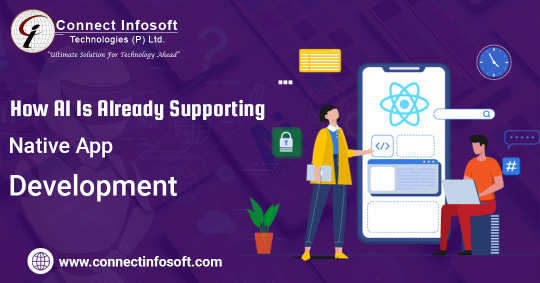
#connectinfosofttechnologies#connectinfosoft#reactnative#reactnativedevteam#reactnativedevelopment#reactnativeappdevelopment#reactnativedeveloper#reactnativeapps#reactnativeapplicationdevelopment#reactnativedevelopers#mobileappdevelopment#reactnativemobileappcompany#hirereactnativedevelopers#websitedesignanddevelopment#artificialintelligence#ai#naturallanguageprocessing#machinelearning#ecommerceapplicationdevelopment#softwaredevelopment#webdevelopment#india#usa#trending#trendingshorts#techtrend#reels#itcompany#techblog
2 notes
·
View notes
Text
Where To Hire The best React Developers?

As per Quora, the top site to hire React developers is from Reactdevelopers.io. A company that only deals in React development services making them the top contender with any other IT services providing company.
Moreover, if you hire React developers from reactdevelopers.io then you get an option to choose developers from a large group large skill sets. They have developers that with skills such as React + Node, React + Rail, React + Go, React + Redux, React + Python, React + AWS, React + AWS, React + Docker, and more. They have also worked on various React frameworks which ensures that you get the best and trending product.
You can hire developers with fullstack expertise which ensures that your product function smoothly. Moreover, to know the cost of hiring React developers across the globe check read the blog.
1 note
·
View note
Text
Top Trends in Software Development: Insights from DI Solutions

In today’s rapidly evolving tech landscape, the need for innovative software solutions is more significant than ever. As businesses strive to stay competitive, understanding the latest trends in software development becomes essential. At DI Solutions, we recognize the importance of adapting to these changes, particularly in the context of hiring skilled professionals. This article explores the top trends in software development and why companies are increasingly looking to hire React developers India and hire React Native developers India.
Understanding the Shift in Software Development Trends
The software development industry has witnessed several transformations over the past decade. New methodologies, frameworks, and tools have emerged, reshaping how developers approach projects. Here are some of the key trends that are currently influencing the software development landscape:
1. Increased Adoption of Agile Methodologies
Agile methodologies have earned immense rage due to their flexibility and efficiency. By breaking projects into smaller, manageable units, teams can adapt to changes quickly, leading to faster delivery times. This approach not only enhances collaboration among team members but also allows for better feedback loops.
2. Rise of Low-Code and No-Code Development
The rise of low-code and no-code platforms enables organizations to develop applications without extensive programming knowledge. These tools empower non-technical users to create software solutions, reducing the reliance on traditional coding practices. As a result, businesses can expedite development timelines and cut costs.
3. Emphasis on DevOps Practices
DevOps is a cultural shift that combines development and operations to improve collaboration and efficiency. By fostering a culture of ongoing integration and delivery, teams can assure faster deployment cycles and enhanced product quality. This trend is especially beneficial for startups looking to scale rapidly.
4. Growing Demand for Mobile Applications
With the increasing use of smartphones, the demand for mobile applications continues to rise. Businesses are focusing on creating user-friendly mobile experiences to engage their customers effectively. This trend has led to a surge in demand for React Native developers in India, as React Native is a popular framework for building cross-platform mobile apps.
Why Hire React Developers in India?
India has emerged as a global hub for software development, particularly for technologies like React and React Native. Here are some reasons why companies are choosing to hire React developers in India:
Cost-Effectiveness
Hiring React developers in India can significantly reduce development costs. With a lower cost of living, Indian developers offer competitive rates without compromising quality. This cost-effectiveness allows startups to allocate their budgets more efficiently.
Access to a Large Talent Pool
India boasts a vast pool of experienced software developers. By hiring React developers in India, companies can tap into a diverse talent pool with extensive experience in building scalable applications. This access to talent ensures that businesses can find developers who meet their specific project requirements.
High-Quality Standards
Indian developers are understood for their strong technical talents and commitment to quality. Many developers in India are well-versed in industry best practices and are experienced in working with global clients. This focus on quality ensures that the software developed meets international standards.
Time Zone Advantage
For companies based in the West, hiring developers in India provides a strategic advantage due to time zone differences. With a significant time overlap, teams can work collaboratively and maintain productivity across different geographical locations.
The Demand for React Native Developers in India
As the demand for mobile applications continues to grow, so does the need for skilled React Native developers in India. React Native enables developers to build applications for both iOS and Android platforms using a single codebase, making it a preferred choice for businesses aiming to reach a broader audience.
Advantages of Hiring React Native Developers in India
Cross-Platform Development: React Native allows for the development of applications that can run on multiple platforms, saving time and resources.
Faster Development Time: With reusable components and a single codebase, React Native significantly reduces development time, enabling faster time-to-market for products.
Improved User Experience: React Native provides a seamless user experience by leveraging native components, ensuring that applications run smoothly on various devices.
Strong Community Support: The React Native community is vibrant and active, providing a wealth of resources, libraries, and frameworks that developers can utilize to enhance their projects.
FAQs about Hiring React and React Native Developers in India
Q1: What skills should I look for when hiring React developers in India?
When hiring React developers, consider candidates with a strong understanding of JavaScript, HTML, and CSS. Look for experience with Redux for state management, proficiency in RESTful APIs, and familiarity with version control systems like Git. A portfolio showcasing previous projects can also provide insight into their capabilities.
Q2: How can I ensure the quality of work from React developers in India?
To ensure quality, establish clear communication channels and set expectations upfront. Conduct regular code reviews and encourage adherence to coding standards. Utilizing project management tools can help track progress and maintain accountability.
Q3: What is the typical hourly rate for React developers in India?
The hourly rate for React developers in India varies based on experience and expertise. On average, rates can range from $15 to $50 per hour. More experienced developers or those with specialized skills may command higher rates.
Q4: How long does it take to develop a React application?
The development timeline for a React application depends on its complexity and features. A simple application may take a few weeks, while more complex projects could take several months. Discussing timelines with your development team can help set realistic expectations.
Q5: Why should I choose DI Solutions for hiring React developers?
DI Solutions offers a comprehensive approach to software development, providing access to a talented pool of React developers in India. Our commitment to quality, timely delivery, and client satisfaction sets us apart. We understand the unique needs of startups and can tailor solutions that meet your specific requirements.
Conclusion
The software development landscape is constantly evolving, and staying abreast of the latest trends is crucial for businesses aiming to succeed. By choosing to hire React developers in India and hire React Native developers in India, companies can leverage cost-effective, high-quality solutions to enhance their digital presence. At DI Solutions, we are dedicated to helping businesses navigate these changes and find the right talent to drive their success.
By understanding the benefits of hiring skilled developers and embracing the latest trends in software development, companies can position themselves for growth in an increasingly competitive market. Reach out to us today to learn more about how we can support your software development needs.
#SoftwareDevelopment#ReactDevelopers#HireReactDeveloperIndia#ReactNativeDevelopers#TechTrends#AgileDevelopment#DevOps#MobileAppDevelopment#DI_Solutions#TechInsights#ReactNative#Programming#WebDevelopment#FreelanceDevelopers#ITIndustry#DigitalTransformation#QualityAssurance#SoftwareEngineering#TalentAcquisition#ReactJS#HireDevelopersIndia#TechCommunity#Innovation#SoftwareSolutions
0 notes
Text
Why Global Startups are Choosing to Hire React Developers in India: A Comprehensive Guide

In today's rapidly evolving tech landscape, startups around the globe are constantly seeking efficient ways to develop user-friendly applications. One of the most popular technologies gaining traction is React, a JavaScript library for building user interfaces. As a result, the need for professional React developers has surged, especially in India. This article explores why global startups are increasingly choosing to hire React developers India and the advantages this decision brings.
The Rise of React
React has transformed how developers create web applications. Its component-based architecture allows for reusable code, making it easier to maintain and scale applications. This flexibility and efficiency are why many startups opt for React as their framework of choice.
Cost-Effectiveness of Hiring in India
One of the immediate reasons international startups choose to hire React developers in India is the price benefit. The hourly rates for developers in India are significantly lower compared to those in North America and Europe. This financial benefit allows startups to allocate their budgets more effectively, focusing on product development and marketing instead of overspending on development costs.
Competitive Pricing
Affordable Talent: Indian developers offer competitive rates without compromising on quality. Startups can hire skilled React developers and still save on overall project costs.
Reduced Operational Expenses: Outsourcing development to India minimizes overhead costs associated with hiring full-time employees in high-cost regions.
Access to a Large Talent Pool
India is home to a vast pool of skilled developers. With a strong emphasis on education in technology and engineering, many universities produce thousands of graduates proficient in React and other modern technologies every year.
Benefits of a Diverse Talent Pool
Variety of Skill Sets: Startups can find developers with various specialties, from front-end development to mobile app creation using React Native.
Experience Across Industries: Many Indian developers have worked with international clients, bringing diverse experience and perspectives to their work.
Quality of Work
Despite the lower prices, the grade of work produced by Indian developers remains elevated. Many developers in India are well-versed in industry best practices and possess robust problem-solving skills.
Emphasis on Continuous Learning
Staying Updated: Indian developers often participate in workshops and online courses to stay current with the latest technologies and frameworks, ensuring they deliver the best solutions.
Strong Work Ethic: Many Indian developers are known for their commitment to quality and timely delivery, which is crucial for startups operating under tight deadlines.
Time Zone Advantage
For startups based in North America and Europe, working with Indian developers offers a unique time zone advantage. India is ahead of these regions, allowing for a follow-the-sun work model.
Benefits of Time Zone Differences
Round-the-Clock Development: Startups can leverage the time difference to ensure that work continues even after their local team has finished for the day. This accelerates the development cycle and improves project turnaround times.
Faster Response Times: With teams in different time zones, startups can address issues and implement changes quickly.
Specialized Skills in React Native
In addition to hiring React developers, many startups are looking to hire React Native developers India for mobile application development. React Native allows developers to create cross-platform apps efficiently, saving time and resources.
Why React Native?
Single Codebase: React Native enables developers to write one codebase for both iOS and Android platforms, which simplifies the development process.
Rich User Experience: With React Native, developers can create applications that provide a native-like experience, which is essential for user engagement and satisfaction.
Finding the Right Talent
When startups decide to hire React developers in India, finding the right talent is crucial. Here are some tips to ensure a successful hiring process:
Tips for Hiring
Assess Experience: Examine for designers with proven experience in React and React Native. Scanning their portfolios and past projects can provide useful insights.
Conduct Technical Interviews: Testing candidates with practical coding challenges can help gauge their skills and problem-solving abilities.
Cultural Fit: Ensure that the developers align with your startup’s culture and values for a smoother working relationship.
FAQs
1. Why should I hire React developers in India?
Hiring React developers in India provides access to a large talent pool, cost savings, and high-quality work. Indian developers are often well-versed in modern technologies and best practices.
2. What is the distinction between React and React Native?
React is primarily used for building web applications, while React Native is a framework for developing mobile applications for iOS and Android using a single codebase.
3. How do I find the best React developers in India?
Look for developers with relevant experience, a strong portfolio, and good communication skills. You can use platforms like LinkedIn, GitHub, and freelance websites to find potential candidates.
4. What are the average costs of hiring React developers in India?
The costs can vary based on experience and location, but generally, hiring React developers in India is significantly more affordable than in North America and Europe.
5. Can I hire React developers on a project basis?
Yes, many companies offer flexible hiring options, including project-based contracts, allowing you to scale your team as needed.
Conclusion
In conclusion, the trend of global startups choosing to hire React developers in India is expected to grow. With the advantages of cost-effectiveness, access to a large talent pool, quality work, and the ability to leverage React Native for mobile applications, India stands out as a prime destination for tech talent. By making informed hiring decisions, startups can build robust applications that meet their business goals while enjoying the benefits of outsourcing.
As the demand for React and React Native continues to rise, now is the perfect time for startups to explore the incredible talent available in India and position themselves for success in the competitive tech landscape.
#HireReactDeveloperIndia#ReactNativeDevelopers#ReactDeveloperIndia#HireReactJSDevelopers#ReactNativeIndia#ReactJSIndia#TechStartups#GlobalStartups#IndianDevelopers#HireDedicatedDevelopers#ReactNativeAppDevelopment#WebDevelopmentIndia#RemoteDevelopers#OutsourcingIndia#TechInnovation#SoftwareDevelopmentIndia#ReactJS#ReactNative#TechTrends
0 notes
Text
Hire React Native Developers in India - The App Ideas
The App Ideasis a reputed Hire React Native Developers in India, and there are many reasons for that. Few of the reasons are mentioned below. On-time delivery.
#ReactNativeDevelopers#ReactNativeDevelopersinIndia#HireReactNativeDevelopers#HireReactNativeDevelopersinIndia#ReactNativeAppDevelopers#ReactNativeAppDevelopersinIndia
0 notes
Text
React Native Programmers: Bridging the Gap Between iOS and Android Development
In the competitive world of mobile app development, businesses seek solutions that offer efficiency, performance, and broad reach. React Native, an open-source framework created by Facebook, has emerged as a game-changer in this space, allowing developers to create high-quality mobile applications for both iOS and Android platforms using a single codebase. React Native programmers are at the forefront of this innovation, bringing their expertise to bridge the gap between these two ecosystems. This article delves into the role of React Native programmers, their skills, and the benefits they bring to mobile app development.
Understanding React Native
React Native is built on JavaScript and React, a popular library for building user interfaces. Unlike traditional native development, which requires separate codebases for iOS and Android, React Native enables developers to write code once and deploy it across both platforms. This approach significantly reduces development time and costs while maintaining the performance and look-and-feel of a native app.
Skills and Expertise of React Native Programmers
React Native programmers possess a unique blend of skills that enable them to excel in cross-platform mobile app development:
Proficiency in JavaScript and React: React Native programmers are well-versed in JavaScript, the backbone of React Native development. Their deep understanding of React, the JavaScript library used for building user interfaces, allows them to create dynamic and responsive mobile apps.
Cross-Platform Development: The core advantage of React Native is its cross-platform capability. React Native programmers use this feature to develop applications that provide a consistent user experience across iOS and Android devices, ensuring broader reach and user engagement.
Knowledge of Native APIs: While React Native handles much of the cross-platform functionality, certain features require access to native APIs. React Native programmers have the expertise to bridge this gap by integrating native code with JavaScript, enabling the use of device-specific features like camera, GPS, and accelerometer.
UI/UX Design: Creating a seamless and intuitive user experience is crucial for mobile apps. React Native programmers leverage their skills in UI/UX design to build attractive, user-friendly interfaces that enhance user satisfaction and retention.
Performance Optimization: Ensuring that an app runs smoothly on both iOS and Android devices is a key challenge. React Native programmers optimize performance by using techniques such as code splitting, lazy loading, and optimizing animations, ensuring that the app is responsive and efficient.
Benefits of Hiring React Native Programmers
Cost Efficiency: React Native’s ability to share code across platforms significantly reduces development costs. By hiring React Native programmers, businesses can save on resources and time compared to developing separate native apps for iOS and Android.
Faster Time-to-Market: React Native programmers can accelerate the development process, allowing businesses to bring their apps to market more quickly. This speed is crucial in today’s fast-paced digital environment, where being first can provide a competitive advantage.
Maintenance and Updates: Maintaining and updating a single codebase is more straightforward and cost-effective than handling multiple codebases. React Native programmers ensure that updates and bug fixes are deployed across both platforms simultaneously, ensuring consistency and reliability.
Scalability: React Native’s modular architecture allows for easy scalability. React Native programmers design applications that can grow and adapt to new requirements, making it easier to add new features and functionalities as the business evolves.
Community and Ecosystem: React Native has a vibrant community of developers and a rich ecosystem of libraries and tools. React Native programmers benefit from this support network, accessing a wealth of resources, plugins, and third-party integrations that enhance development efficiency and app functionality.
Conclusion
React Native programmers play a pivotal role in the mobile app development landscape, offering a powerful solution for businesses looking to build high-quality, cross-platform applications. Their expertise in JavaScript, React, and native API integration enables them to create dynamic, performant, and user-friendly apps that run seamlessly on both iOS and Android devices. By hiring React Native programmers, businesses can achieve cost efficiency, faster time-to-market, and scalable solutions that meet the demands of today’s competitive market. Investing in React Native development ensures that your mobile app reaches a broader audience, providing a consistent and engaging user experience that drives business success.
1 note
·
View note
Text
Things to Consider While Hiring React Native Developers
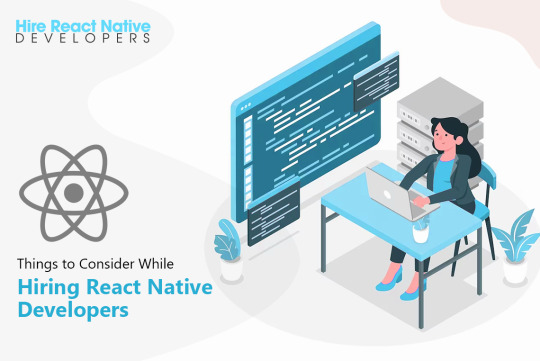
Whether you're using Uber Eats or a comparable app, it's likely already on your phone. You will be acquainted with Walmart, Instagram, Skype, and Facebook services. As a company owner, you've probably wondered what creating an app like this would take. This kind of application is built using the React Native framework.
React Native developers if you're looking to create feature-packed, intuitive mobile applications. You can have native applications built for Android and iOS by a skilled React Native developer; the choice is yours, based on your budget.
What is React Native?
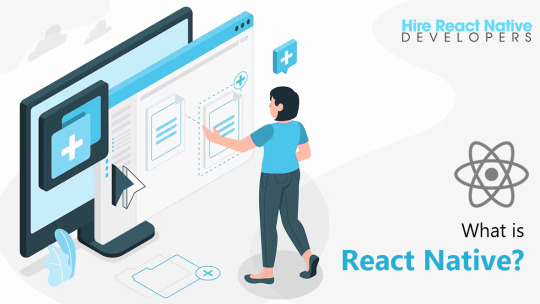
Verify your familiarity with React Native before proceeding. Doing so will prepare you to ask a developer specializing in this technology the right questions.
The open-source JavaScript framework known as React Native was created by Facebook, in case you didn't know. With this framework, developers just need to write their apps once to have them function on several platforms, including iOS and Android.
React Native developers- The work they do
A master React.js developer will have a firm grasp of JavaScript and experience with API services, cross-platform technologies, and the many native platforms that comprise the app.
One or more of the following also falls within the purview of React Native:
Acquire the skills necessary to develop complex software.
Capable of identifying problems and finding solutions.
You may make your React web app mobile-friendly by migrating it to React Native.
Reducing the performance gap between native and cross-platform applications.
Elevating components to get peak performance.
The ability to work on React modules as required is a must.
Making use of the Redux framework to boost the app's performance.
Intended to facilitate software testing automation.
Important considerations while recruiting React Native developers
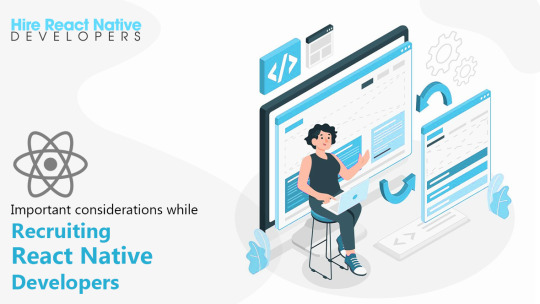
When you're looking to hire a dedicated React Native mobile app developer from a React.js development company, keep these points in mind.
1. JavaScript expertise
Verify their JavaScript proficiency before contacting them for React.js development services or employing them for React Native app development. One may use JavaScript to organize the program's logic, comprehend its flow, and construct strong components.
2. Components and functionalities of React Native
Understanding JSK, Virtual DOM, and the component lifecycle is essential for any reputable, experienced React development agency. Verify that the candidate is well-versed in all aspects of React Native before employing them.
Developers must have the ability to customize and control the state and settings of React components. This makes it possible to onboard the whole development process with relative ease.
3. Writing functional and clean codes
Experienced React Native developers must deeply understand building applications on several platforms. In the future, it will be crucial to maintain it and make any required improvements.
Everyone working on an app has to be able to write clean, functioning scripts if the process is to go smoothly. On top of that, developers need to know exactly where various codes intersect. To begin developing code, familiarize yourself with the various code classes, build mock tests, and locate fragments and events based on React Native.
4. Incorporating native features
On-demand, the React Native team is also supposed to be able to build native features. When hiring developers, ensure they have experience with native frameworks like Swift, Android Studio, Objective C, and others. They should also have a good grasp of the platform's properties.
If you want to create mobile applications with amazing user interfaces and personalized widgets that consumers won't quickly forget, hiring React Native developers should be your ultimate goal. The many in-built capabilities of the smartphone—its speakers, cameras, GPS, and more—make all of this feasible.
Why hire React Native developers?
Hiring dedicated React Native app developers is a smart move for businesses seeking to build cross-platform mobile apps at a reasonable price. Businesses can use both the iOS and Android platforms using React Native, all while maintaining high-quality and rapid market entry.
1. Faster development time
Because it is easy to reuse code between platforms, developers might save time by utilizing React Native. Its vast library of third-party plug-ins makes the complete development cycle easier. For example, JavaScript is a programming language with support for modules and extensions built right in. The npm Registry and the React Native Directory are two places you could look for these extensions.
You may see the changes to the code as they happen using React Native's live reload feature. Programmers aiming to shorten the often lengthy compilation time of native languages like Java may find this feature handy.
2. High performance and scalability
React Native is a popular and powerful framework built in JavaScript that developers may use to construct fast, scalable mobile applications. The animations are more fluid, and the load times are faster thanks to the native components and enhanced rendering. Because app components are modular and reusable, it's easier to maintain and update the app, making it more scalable.
3. Cutting costs
React Native is a free, open-source, and barrier-free framework. Businesses may save significant money by hiring React Native specialists rather than paying premium salaries to developers with experience in other platforms.
Also Read: Cost to Develop a React Native Mobile Application
Conclusion
Hiring skilled React Native developers is crucial if you want to build first-rate mobile applications that meet your business needs. Following the aforementioned methods will help you optimize your recruitment strategy and attract top tech talent.
#hirereactnativedevelopers#mobileappdevelopment#mobileapp#reactnativedevelopers#reactnativedevelopment#reactnativeapps#appdevelopment#mobileapps
0 notes
Text
Experience the Power of React Native with Our Dev Team

Do you want to hire a React Native App Developer team? If you want to hire then you should consult with CodeTribe Solutions organisation now. You can harness the potential of React Native for your app. Our developers are skilled in delivering top-notch cross-platform solutions. To know more get in touch with us now!
#reactnativedevelopment#reactnative#reactnativedevelopers#react native app developers#react native app development#app development#reactnativeappdevelopers#appdeveloopmentservices#mobile application development
0 notes
Text
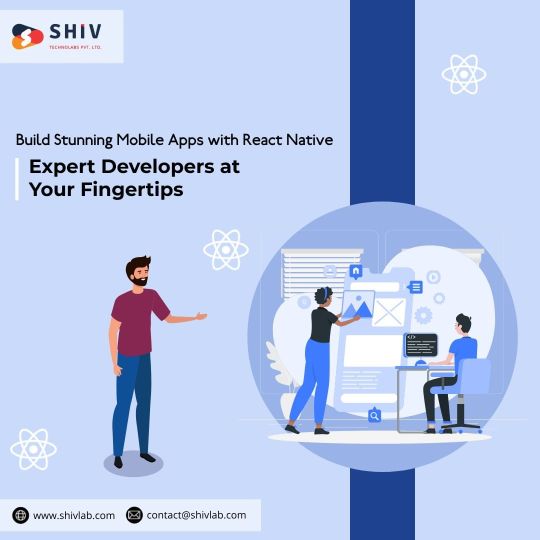
Hire Dedicated React Native App Developers
1 note
·
View note
Text
How Can I Choose The Best React Native Developer?
Discover a comprehensive guide on finding the best React Native developer. Gain insights on evaluating JavaScript, and React skills, reviewing portfolios, assessing communication, and identifying passionate problem-solvers who stay updated on React Native trends. Elevate your app development process with valuable tips.
0 notes
Text

Hire React Native Developers in India - The App Ideas
The App Ideas is a reputed Hire React Native Developers in India, and there are many reasons for that. Few of the reasons are mentioned below. On-time delivery.
#ReactNativeDevelopers#ReactNativeDevelopersinIndia#HireReactNativeDevelopers#HireReactNativeDevelopersinIndia
0 notes
Text
instagram
#ReactNativeDevelopment 🚀#MobileAppDevelopment 📱#CrossPlatformApps 🔄#FastAndSecure ⚡#UserFriendlyDesign 🎨#OmegaSoftwares 🏆#TechInnovation 💡#BusinessGrowth 📈#reactnative#reactnativedeveloper#MobileApps#mobileappdesign#mobileapplication#Instagram
1 note
·
View note
Text
#reactnative#reactnativedevelopment#appdevelopment#mobile app development#app developers#website development company#web design services
0 notes
Text
Find the Best React Native Developers for Your Next Mobile App project.
Are you seeking top-tier React Native developers to bring your mobile app? Explore expert developers dedicated to creating cutting-edge, cross-platform solutions tailored to your unique requirements. Upgrade your mobile app by partnering with our skilled and committed React Native professionals.
#hirereactnativedevelopers#mobileappdevelopment#mobileapp#reactnativedevelopers#reactnativedevelopment#reactnativeapps#appdevelopment#mobileapps
0 notes